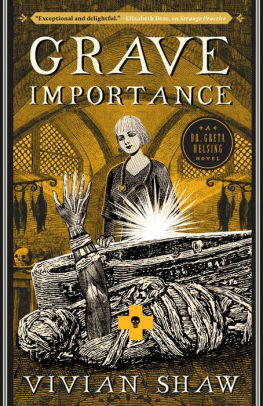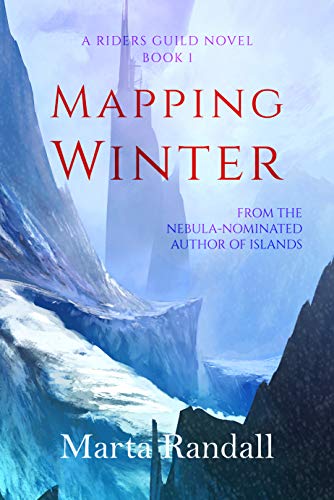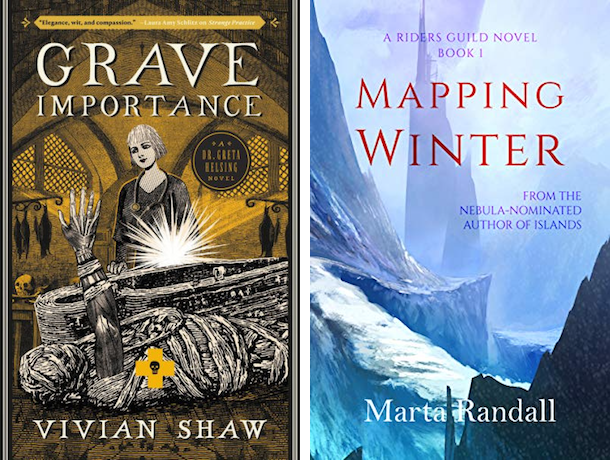The two books I want to tell you about today are tonally very different to each other. One’s light and open and generally about people who mean well; the other is dark and claustrophobic and has a cast of people who’re largely trapped by circumstance into hurting each other.
I’ve been waiting to read Vivian Shaw’s third (and final) Greta Helsing novel, Grave Importance, for more than a year.
Buy the Book


Grave Importance
I don’t think I’m alone in having thoroughly enjoyed Strange Practice (2017) and Dreadful Company (2018), and Grave Importance builds on the strengths—and humour—of the first two novels in the trilogy to give us Greta in her element, filling in for the medical director of the exclusive Oasis Natron, a hospital and wellness spa catering to the medical needs of Egyptian mummies.
Greta’s absolutely thrilled to be able to play with Oasis Natron’s fancy diagnostic toys, but a mysterious ailment is causing her physically quite fragile patients to have fainting spells. Then her best friend, vampire Ruthven, shows up with a serious medical problem that can only be alleviated by the hospitals of Hell. These things are connected, and connected too to the weakness in the fabric of reality that was exacerbated by the events of Dreadful Company. All too soon, Greta finds herself on the front lines of a field hospital at the end of the world…
In Grave Importance, Shaw gives us a deftly characterised story in a fascinating world. And she has a really great voice: an absolute talent for combining humanity, humour, and poignancy. I think it’s a fabulous capstone to the series, and I look forward to seeing what kind of material Shaw turns her hand to next.
I’d never heard of Marta Randall before an acquaintance mentioned the republication (with substantial edits) of a fantasy novel of hers from the early 1980s. It seems Randall’s career as a novelist came to an end thanks to a combination of market forces and sucky editorial experiences, and from Mapping Winter—that substantially rewritten republication—I can only say that’s a damn shame.
Buy the Book


Mapping Winter
Her sensibilities here remind me rather of K.J. Parker: there’s the same careful construction of a social world; the absence of magic; the concern with a society whose structures and traditions are in the process of being altered by technological change and the attendant disruption to social structures; and characters who may not be likeable but are, within the constraints of their world, understandable and relatable. It is pleasing to be able to trace, in part, the evolution of “low” fantasy to another of the women of the 1980s who quietly went about revolutionising the genre in the face of anti-feminist backlash… even though every ten or twenty years, like clockwork, those of us who were too young to witness them the first time around have to appeal to our elders to help us with the work of rediscovery in the face of a persistent, repetitive erasure of memory.
Mapping Winter is an atmospheric, strongly characterised story about paradoxes of honour and loyalty, social change, murder, and making shitty decisions (or the best decisions one knows how to make) in pretty terrible circumstances. It’s definitely worth checking out—and it has a sequel, The River South, which also looks good.
What are you guys reading lately?
Liz Bourke is a cranky queer person who reads books. She holds a Ph.D in Classics from Trinity College, Dublin. Her first book, Sleeping With Monsters, a collection of reviews and criticism, was published in 2017 by Aqueduct Press. It was a finalist for the 2018 Locus Awards and was nominated for a 2018 Hugo Award in Best Related Work. Find her at her blog, where she’s been known to talk about even more books thanks to her Patreon supporters. Or find her at her Twitter. She supports the work of the Irish Refugee Council, the Transgender Equality Network Ireland, and the Abortion Rights Campaign.










